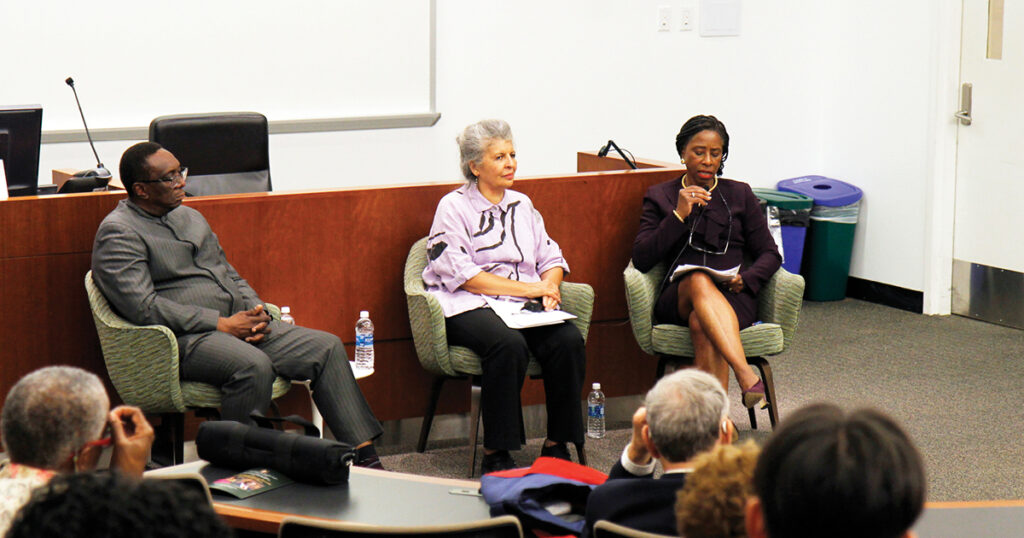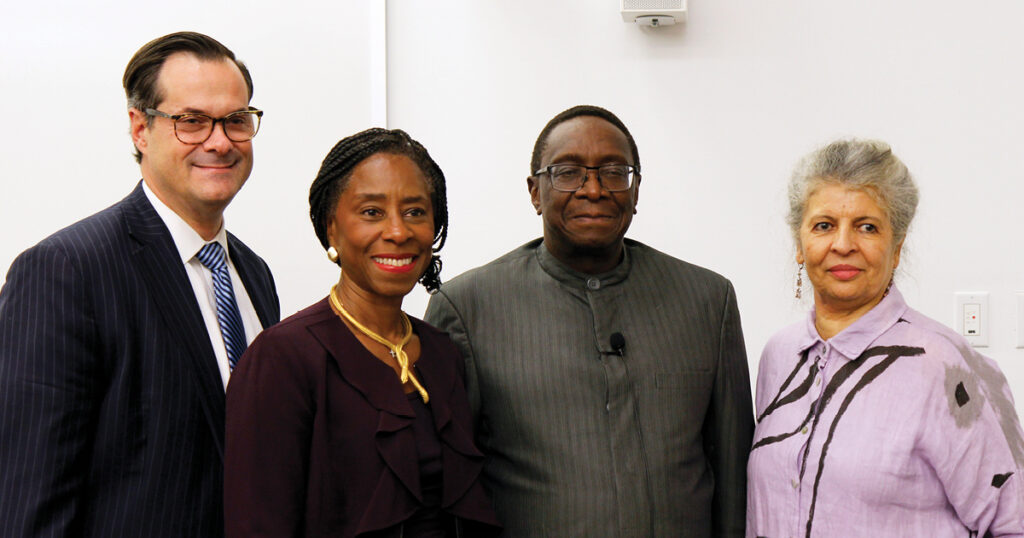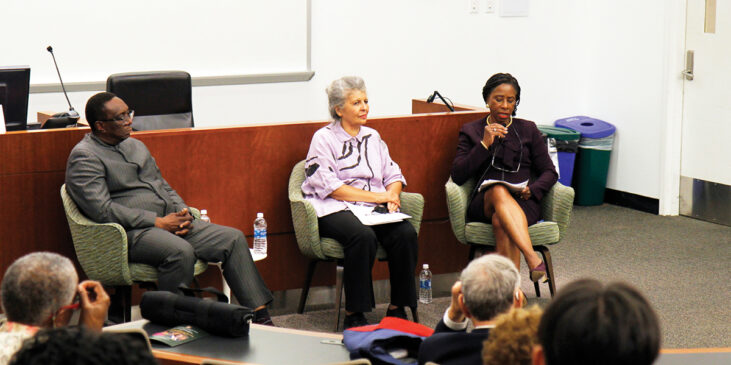
On the evening of October 23, NYLS hosted a gathering of esteemed legal minds for A Conversation on Constitutionalism and the Rule of Law With Two Presiding Justices, presented in collaboration with the Historical Society of the New York Courts and the New York State Supreme Court Appellate Division, First Department.
The conversation explored how the principles of constitutionalism and the rule of law manifest, similarly and differently, across both New York and South Africa, and how courts grapple with country-specific issues and societal challenges at large. Featured speakers included Hon. Dianne T. Renwick, Presiding Justice of the Appellate Division, First Department, and Hon. Dunstan Mlambo, Judge President of the Gauteng Division of the High Court of South Africa, with insightful moderation by Penelope Andrews, John Marshall Harlan II Professor of Law and Director of the Racial Justice Project at NYLS. Professor Andrews is also an emeritus trustee of the Historical Society of the New York Courts.
NYLS Dean and President Anthony W. Crowell commenced the event with welcoming remarks, touching on the critical role of constitutionalism in supporting democracy. Professor Andrews echoed the significance of this theme, framing the dialogue by stating, “Constitutionalism is at the foundation of a society that respects and aims to uphold human rights and civil liberties. It is what grounds democracy, and it is through constitutionalism and the rule of law that we ensure accountability, transparency, and a judiciary that serves its citizens.”
The discussion opened with an invitation for Justices Renwick and Mlambo to share their personal journeys to the bench, focusing on lessons learned as attorneys that they’ve carried into judgeship. Both judges cited their families as the first teachers of their guiding principles; Justice Renwick emphasized treating others how one wishes to be treated, while Judge Mlambo emphasized humility and respect for all.
Addressing the role of the rule of law, Justice Renwick said, “We all know our society is changing, our world is changing. We need to ensure that we are in constant conversation about what the rule of law is and what these concepts mean. Citizens must trust in the integrity of the law and the integrity of our institutions.”
Judge Mlambo offered his perspective as a South African, stating, “The rule of law is the glue that keeps us together. We have recognized as lawyers and as judges that we need to ensure that South African society understands and knows our Constitution. It will be useless if the people it is meant to benefit don’t know it very well and don’t see it in action. And for it to remain true to what its objectives are, the rule of law is key.”
A key moment in the discussion revolved around Judge Mlambo’s decision to allow the 2014 Oscar Pistorius trial to be broadcast, a ruling that encouraged transparency and reshaped South Africans’ perception of the court. Judge Mlambo explained that, in his perspective, broadcasting the trial presented an opportunity to debunk myths about how South Africans were being represented in court, as well as to empower the public by showcasing a Black judge on television.
Touching on the role of social media in modern democracy, Justice Renwick reflected on a 2015 case in which she held that social media companies served with warrants for customer accounts lacked a constitutional or statutory right to challenge the warrants on customers’ behalf. She highlighted the importance of an engaged judiciary and continuous legal discourse, especially in the face of technological advances and increased risk of widespread misinformation.
The conversation concluded with an interactive Q&A session, where both judges addressed questions ranging from the judge selection process in their respective countries to affirmative action and judicial diversity. Overall, the discussion served as an insightful exploration of the judiciary’s responsibilities and challenges in upholding constitutional principles across different legal systems and national contexts. NYLS is proud to partner with institutions such as the Historical Society and the Appellate Division, First Department to foster meaningful conversations like these within the NYLS community.

About the Presenters
The Historical Society of the New York Courts brings together legal professionals to preserve, protect, and promote the legal history of New York. The Society aims to empower New York students to create change, build an informed citizenry, capture living history, and share unique legal history stories.
The New York State Supreme Court Appellate Division, First Department was established by the New York State Constitution of 1894 to serve as an intermediate appellate court with jurisdiction over New York and Bronx Counties. The Division wields the power and responsibility of reviewing questions of law and making new findings of fact, often serving as the court of last resort in most cases.

